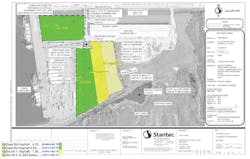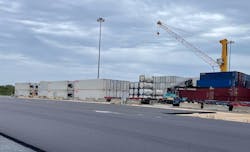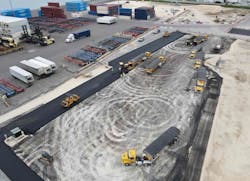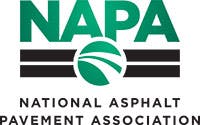SeaPort Manatee, Florida is situated on the Gulf of Mexico in the middle of Florida’s west coast. It’s a large deepwater seaport at the entrance of Tampa Bay that began active operation in 1970 and is the closest such facility to the Panama Canal. It handles millions of tons of cargo every year, both imports and exports, including produce and juices, petroleum products, metals, and construction equipment.
With volume on the increase, the Port Manatee County Port Authority determined in 2021 that the busy port needed an expansion. The facility had recently seen a 53% jump in container trade and quickly needed to expand its yard. However, with that high level of demand, maximum efficiency during the expansion process was essential to keep the port operational throughout.
Crisdel Group Inc., a family-owned infrastructure construction company, was chosen as the general contractor. Raul Gonzalez, Crisdel’s Florida Area Manager, says, “We have extensive experience in port and marine terminal construction and expansion.” That depth of experience informed the company’s material of choice — asphalt — to expand the yard. Asphalt would be fast to install, which meant there would be less downtime and inconvenience during the project.
Material of Choice
Gonzalez believes that concrete was considered as a possibility when the project was still in the planning stages, but because it’s a rigid material and settlement could occur, the combination could pose a significant problem. Asphalt, on the other hand, is flexible and cures very quickly. After the earthwork grading and soil surcharge, Crisdel knew asphalt would perform well in post-construction settlement. Asphalt, when designed properly, offers exceptional performance under the most adverse loading conditions. It’s particularly useful in situations where there is high-stress loading — in this case, from shipping containers. Its flexibility prevents the cracking issues that would occur with concrete.“Future maintenance on asphalt would also be much more cost-effective than it would be on concrete,” Gonzalez says. Because asphalt was locally available, durable, resilient, relatively easy to install, and economical, it was the obvious choice.
High Demand
The pavement was constructed in three courses: lower-grade asphalt binders in the first two courses, and a higher grade in the top-wearing course. This was more economical than using the higher grade asphalt in all three six-inch layers, a depth necessitated by the stresses that would be exerted by the loaders lifting the shipping containers.
In all, over 17 acres of new yard were created using 27,000 tons of material. Ajax utilized Superpave 12.5 high-mix asphalt, performance graded 76-22, as necessitated by the Florida climate. The work was done quickly, completed in about 25 shifts.
That was important. Time was of the essence, given the considerable traffic at the port, much of it with refrigerated containers. “They were eager to get on anything we laid as soon as we left,” notes Price. “They were clamoring for every area as soon as we could complete it and give it to them.”
Gonzalez confirms that, adding, “They were using areas for storing corrugated board boxes, empty and full containers, regardless of whether they were refrigerated or not. If it was open real estate, they were taking it.” He mentions, however, that it was somewhat challenging working around the ongoing operations in the port facility. Ajax needed to strategize how to turn over newly accessible areas while still being able to get to active work zones.
Looking Back
He also recommends asphalt for those considering other similar projects. “It continues to be a sound, cost-effective choice for structural pavement sections, even in situations with heavy loading. The key to success is a proper mix design.”
Download the case study pdf here.




